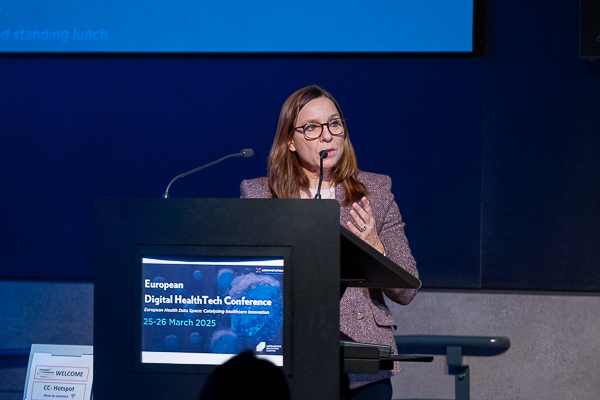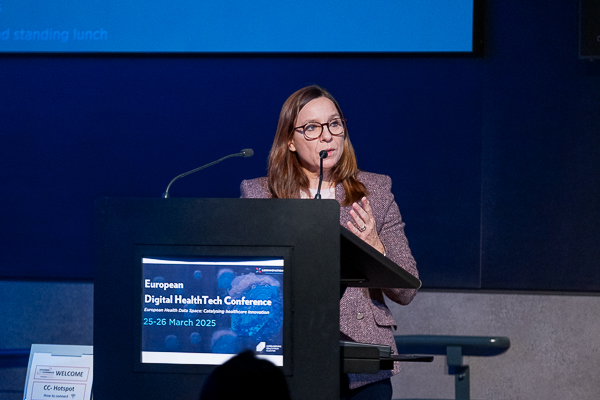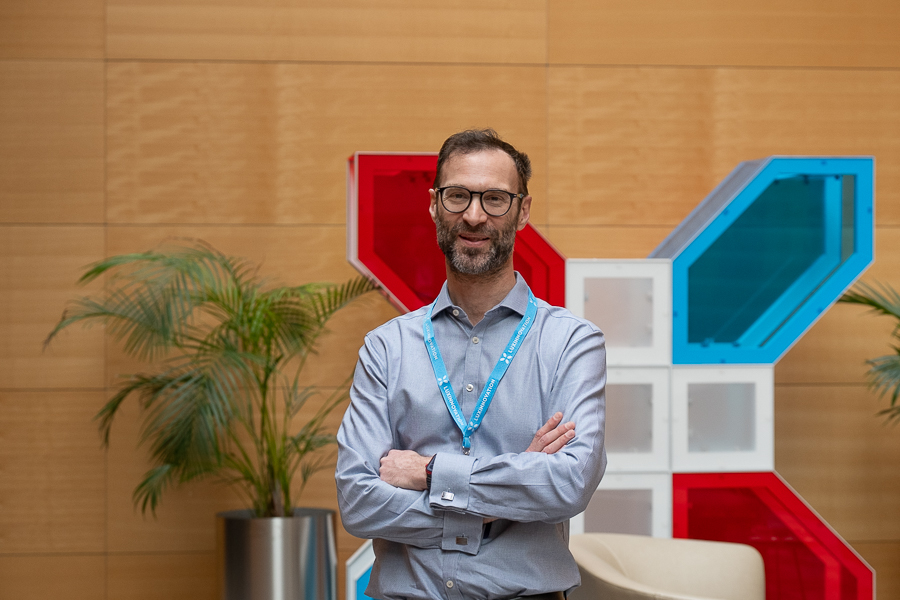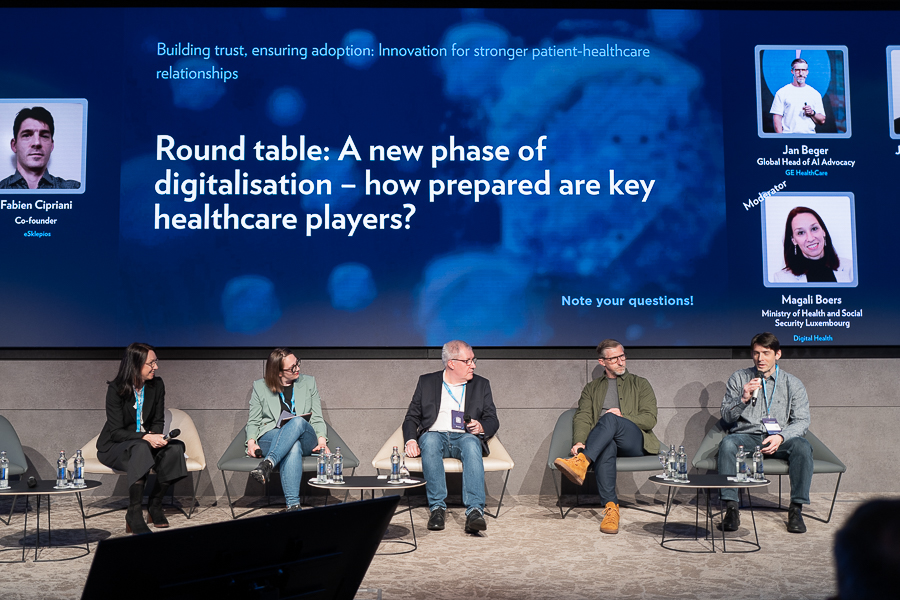 Stéphanie Obertin, Luxembourg's Minister for Digitalisation, Minister for Research and Higher Education;
Credit: Ali Sahib, Chronicle.lu
Stéphanie Obertin, Luxembourg's Minister for Digitalisation, Minister for Research and Higher Education;
Credit: Ali Sahib, Chronicle.lu
The European Digital Healthtech Conference 2025 took place at the Luxembourg Chamber of Commerce in Luxembourg-Kirchberg on Tuesday 25 and Wednesday 26 March 2025.
This fully booked event focused on the European Health Data Space (EHDS) and how it is "catalysing healthcare innovation". The organisers were Luxinnovation (Luxembourg's national innovation agency), Medical Valley and EIT Health.
Speakers included Luxinnovation CEO Mario Grotz, the Head of the Representation of the European Commission to Luxembourg, Anne Calteux, and Luxembourg's Minister for Digitalisation and Minister for Research and Higher Education, Stéphanie Obertin, among many others from Luxembourg and across Europe. Topics addressed over the two days included the implementation and the impact of the EHDS, as well as the related opportunities and challenges, digital solutions for better healthcare and innovation for stronger patient-healthcare relationships.
Minister Obertin delivered her address on Wednesday on the subject of "Healthcare digitalisation in Luxembourg: Seizing future innovation opportunities". She said there was “an opportunity to rethink our healthcare systems, to strengthen the quality of care [and] empower citizens in managing their own data”. The minister noted that one of the priorities of the Luxembourg government in the field of research was “the development of personalised medicine”; she acknowledged the importance of high-quality, well-structured and accessible data “in a secure and trusted environment”, which “enable us to detect weak signals, identify tailored treatments and design truly individualised care pathways”. Consequently, the government plans to “promote in the short term an ambitious yet essential principle: the right to data, meaning the right to benefit from one’s own data”.
Minister Obertin added that this was not only a question of access or data protection but also “engagement”, as well as innovation “in the service of patients”. She highlighted the ParkinsonNet Luxembourg multidisciplinary network as “a concrete example of an innovative approach in Luxembourg” - one which aims to improve patients’ quality of life. She noted that such a network could be “enriched through technological tools that allow patients to actively engage with their data, whether by participating in research projects, being informed of medically relevant findings or contributing to ongoing improvements in care […]”. The minister emphasised that the government seeks to support “the convergence technological innovation, clinical research and citizen engagement”.
She added that this patient-centred approach “also aligns closely with the government's three national strategies currently in their finalisation stages: the national AI strategy, the national data strategy and the national quantum technologies strategy”. Minister Obertin assured that Luxembourg has “the skills, the vision and the determination to become the leading hub for digital health and personalised medicine. But more importantly, we aim to do this with and for the citizens, guided by transparency, responsibility and shared progress”.
Chronicle.lu had the opportunity to speak with Jean-Philippe Arié, PhD, Luxembourg HealthTech Cluster Manager (Luxinnovation), about the event. He explained that the new EU regulation, the EHDS, “will frame all the data exchanges in the medical sector, including from the care, with the patients, up to the research”. There is currently a transition period in place until 2029 in which to implement the new regulation. Jean-Philippe Arié said: “I think it's a really important subject that is ongoing, because it will change our daily life as citizens, as patients, it will change the life of doctors, of researchers, the organisation of the hospital, so a lot of things. And the transition period - even if it will be reimplemented in 2029 - is still very short to transform everything”.
He added that the European Digital Healthtech Conference 2025 had brought together experts from across Europe and beyond (Asia, Canada...) and demonstrated the interest generated by the subject. "We wanted to put all these experts together in order to discuss where do we stand in terms of implementation of this new regulation, what are the good ideas and maybe the things to avoid”, by exploring "different aspects”. He mentioned both the primary and secondary use of data, with the former centred around patients sharing data and doctors saving data during consultations, also to be shared with other doctors, etc. and the second referring to shared data benefiting research.
Jean-Philippe Arié described the new regulation as "a super opportunity also for innovation" and noted that Luxinnovation will embrace it "to create more innovation, more software, more connection, more artificial intelligence, in order that we can benefit the most from this regulation". However, for this to work, everyone has to "truly" adopt the regulation, from patients and doctors to researchers. "We need to create a trusted environment so patients will accept sharing their data, doctors will really take the opportunity of sharing their findings with other doctors and with [researchers] and the research will then benefit from the data sets," he said, stressing the importance of "trust" in this context. He concluded that "all the countries of Europe will share this trust into this EHDS regulation, so that this regulation will [reach] the goal of improving at the end the care and the patients’ care. Why is it so important? Because now we are in a new era of medicine where personalised medicine is so important; you have, as a patient, individual factors that can influence the evolution of some diseases, and so we are going more and more in this concept of personalised medicine [and to get] there, we really need more research, more software [...] able to take this data, combine with data and algorithms, artificial intelligence, [which] will provide us with a lot of insights in order to make better care".











